 Petzlover
PetzloverGran Mastin de Borinquen is originated from United States but Perro de Toro is originated from Spain. Gran Mastin de Borinquen may grow 7 cm / 3 inches higher than Perro de Toro. Gran Mastin de Borinquen may weigh 28 kg / 62 pounds more than Perro de Toro. Both Gran Mastin de Borinquen and Perro de Toro has almost same life span. Gran Mastin de Borinquen may have more litter size than Perro de Toro. Both Gran Mastin de Borinquen and Perro de Toro requires Low Maintenance.
The Gran Mastín de Borinquen is also referred to as the Puerto Rican Mastiff or the Mastín Borincano and is actually native to Puerto Rico.
The dog seems to have originated long ago already during the 16th century. Its a dog that descends from a number of dogs, and the dog from these crosses became a huge, ferocious dog.
For centuries the Gran Mastin de Borinquen was used to protect the estates of the Spanish nobility. Today the breed is considered rare and it isn't recognized by any major kennel club as a standardized breed.
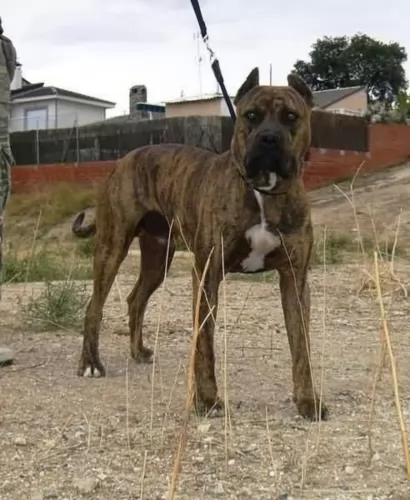 The rare Spanish Perro de Toro seems to have unclear origins, with some saying the dog is a direct descendant of the Toulouse Mastiff, while others say that the dog was developed by crossing the Alano with the Dogue de Bordeaux.
The rare Spanish Perro de Toro seems to have unclear origins, with some saying the dog is a direct descendant of the Toulouse Mastiff, while others say that the dog was developed by crossing the Alano with the Dogue de Bordeaux.
The dog hails from Spain and was once used as a fighting kind of dog but today it is essentially a family pet. The dog is an ancient breed, an ancestor of many of the molosser breeds that are around today.
The Gran Mastin de Borinquen is a large dog. He stands roughly between 56 and 71cm and weighs in at between 41 and 68kg.
He is well muscled with a large head and short floppy ears but until recently the ears have always been cropped. The nose is black, the eyes dark brown and small and he has an alert, intelligent look to him.
These days the tail is kept long and it is held low. The coat is short in length and harsh with the colour being fawn, black, cream or brindle. You'll also find some small inclusions of white on the coat.
Loyal and protective, the Gran Mastin de Borinquen forms a strong bond with his master, becoming aggressive with any stranger who comes too close to his owner.Its a dog that has been taught to be aggressive so he isn't the best pet to choose if you have children in the home. He isn't the best dog either for first time dog owners, particularly if the person isn't a strong, firm person around him, showing who is boss.
However there are people who have had their pet trained and socialized and who claim he makes a wonderful family pet. The way a dog is brought up can play a large role in the way he turns out.
Train and socialize your Gran Mastin de Borinquen because he is inclined to be strong-willed and for a large, aggressive type of dog, you want him to be obeying you.
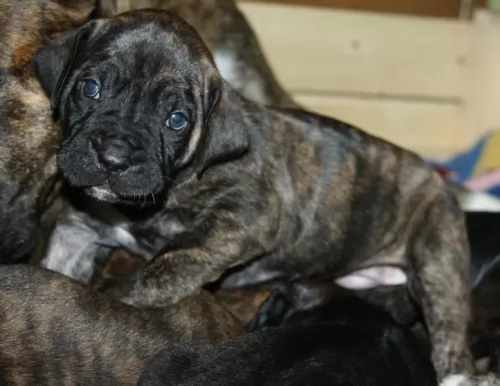 This is a strong, powerful, large breed of dog, making a good watchdog and guardian. He can be anything from 56 to 64cm in height and weigh between 34 and 40kg.
This is a strong, powerful, large breed of dog, making a good watchdog and guardian. He can be anything from 56 to 64cm in height and weigh between 34 and 40kg.
The nose of the dog is broad and black, the ears are set high and droop over slightly,making them floppy ears, but they have always been cropped to stand up erect.
He's a sturdy dog and the tail is fairly thick at the base, tapering to a point. These days it tends to be undocked and left long. The neck is strong and powerful too and the head brachycephalic. The short coat includes colors such as yellow, grey, fawn and red with the black mask.
The Spanish Bulldog looks fairly intimidating and he will certainly need training and socialization if he is to be obedient and well behaved.
He isn’t aggressive but is confident, dominant, fearless, loyal and also loving towards his owner. He is devoted towards his human family and is good with children. Like any mastiff type breed, he will need a firm, kind, consistent, patient owner. This is the kind of owner who will understand this breed type and take time out with him to exercise him and provide him with mental and physical stimulation so as to prevent boredom.
Noble, courageous and loyal, a trained, socialized Gran Mastin de Borinquen who has learned simple commands such as sit, down, come, stay, lie-down and heel will be an absolute pleasure to have around and be a well behaved, obedient companion for you.
Your Gran Masin is a dignified, loving animal, but because of his size and his origin, bred to be aggressive, he isn’t looked upon as the first choice when you’ve got small children in the home. With the right owner – fair, firm and loving - he makes a splendid pet.
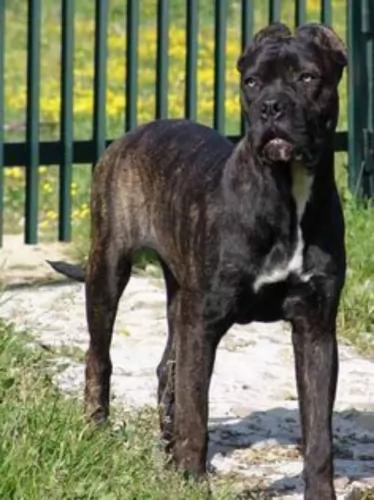 Contrary to what many people think, the temperament of the Perro de Toro is calm and well balanced. This is a reliable, loving, loyal dog who wants to protect his human family.
Contrary to what many people think, the temperament of the Perro de Toro is calm and well balanced. This is a reliable, loving, loyal dog who wants to protect his human family.
He gets on well with children and with pets in the home and when trained and socialized, this intelligent dog is well mannered, obedient and sometimes even submissive.
True, the Perro de Toro has a history of being involved in all kinds of things, from hunting to fighting and also being a working dog, but he is now waiting to show you what a splendid pet he can be if he is raised by the right kind of people.
Your Gran Mastin de Borinquen can get to 12 years of age with good care. Mastiff-type dogs like this can be prone to eye problems as well as having to tackle joint problems such as hip dysplasia.
Other issues that can appear in this breed, but are unlikely be cancer, bloat, hypothyroidism and von Willebrand’s Disease which is a bleeding disorder.
Remember to do daily inspections of your Gran Mastin de Borinquen for fleas and ticks, particularly during the Summer month. Toxins introduced into the body by a tick bite for instance can make your pet seriously ill so that veterinary intervention is required.
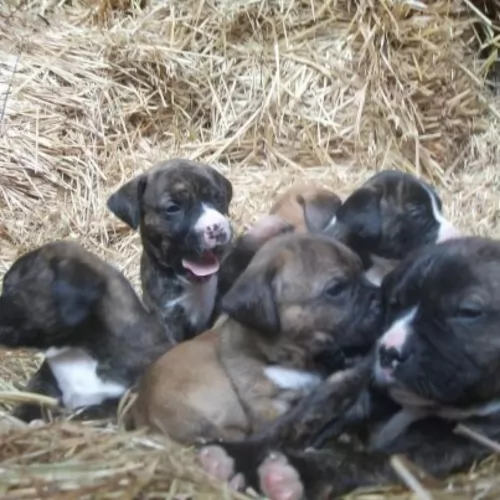 This is a dog breed that is fit and healthy, but to keep him that way you want to make sure he has enough exercise, love and nutritious food.
This is a dog breed that is fit and healthy, but to keep him that way you want to make sure he has enough exercise, love and nutritious food.
He is not known to suffer from any particular disease, but even so, it is wise to be aware of some of the common dog illnesses that your dog could pick up so you can get veterinary help for him just as soon as possible.
With cancer, cells grow rapidly and invade tissue. Dogs can get any of the many cancers there are. Both hereditary and environmental factors can contribute to the development of cancer in canines. Cancer can show up as lumps, swelling, sores that won’t heal, weight loss and difficulty with breathing.
Heartworms are transmitted from one animal to the next by mosquitoes. These worms live in the heart and pulmonary arteries of an infected animal, travelling through the bloodstream and causing havoc. Heartworm is dangerous and can actually be life threatening. Symptoms include coughing, vomiting, battling to breathe and weight loss.
This is a viral disease that can strike terror in anybody who has seen an animal with rabies. It affects the brain and spinal cord of your dog. It is preventable through means of a vaccine. Once symptoms appear, it is a disease which is nearly always fatal.
The Gran Mastin de Borinquen, with his short coat, is a relatively low maintenance breed. Brush him at least twice a week to keep the coat free of loose hairs. Other grooming requirements are keeping his ears clean and dry. You can ask about alcohol wipes at your local pet shop to use in his ears. Check the nails too and remember to brush his teeth a couple of times a week to avoid dental decay.
You won't find the Gran Mastin de Borinquen being a particularly high energy dog but he also isn't a couch potato. If you enjoy a walk every day for your own good health, include him in these walks and give him a game of ball every now and again.
This Mastiff -type dog is large, and they tend to be fairly lazy, not using up great deals of energy. Young dogs however use up more energy and will require a diet with good quality protein.
Dogs that have been spayed or neutered as well as senior dogs will require less calories. If you buy commercially manufactured food, check the labels carefully and buy high quality food for a large breed.
Don't just feed your Gran Mastin kibble everyday but alternate it sometimes, mixing in some raw meat into his kibble or mixing in some cooked chicken, rice and vegetables.
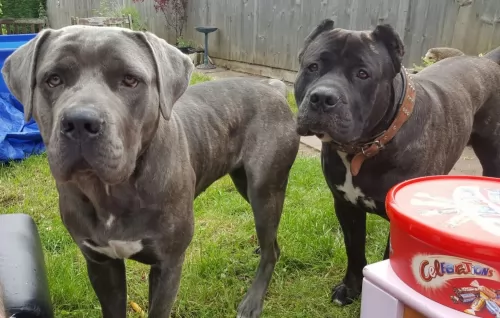 If they are not being used as working dogs, they are family pets, and you need to give them a lot of daily exercise. You will need to give him some walks or hikes and allow him a good run in the country.
If they are not being used as working dogs, they are family pets, and you need to give them a lot of daily exercise. You will need to give him some walks or hikes and allow him a good run in the country.
The Perro de Toro is a short haired dog, and as a moderate shedder, he isn’t going to require too much grooming. A brushing twice a week will help get rid of his hair.
When brushing him, turn it into a bit of a grooming session and check inside his ears, look at his eyes and try to look inside his mouth. He can’t tell you if he has terrible toothache from a rotting tooth and he will rely on you to check his teeth.
Mastiff type dogs need a wholesome diet to remain strong and active. If you are going to feed your pet one of the commercially manufactured dog foods, make sure it is one of the top quality ones.
Avoid the ones that use lots of colorants, preservatives and unhealthy fillers as these can make your dog sick. Try and give him some home-made food which can be added into his dry kibble occasionally.
Boiled chicken, brown rice or pasta and some vegetables such as carrots, sweet potato and spinach chopped up will be excellent for him and will ensure he doesn’t battle with digestive upsets. If you can, every now and then try to include some raw meat for the benefit and health of your pet. Never leave him without a bowl of fresh, cool water.